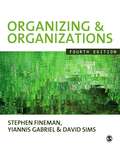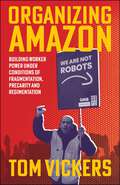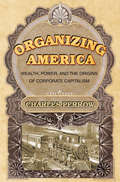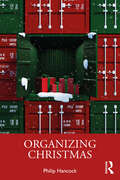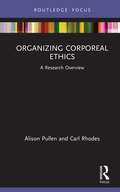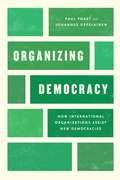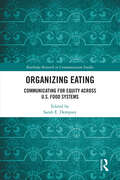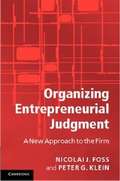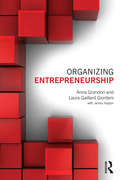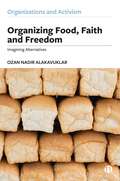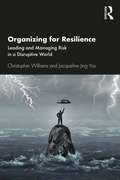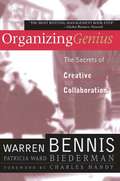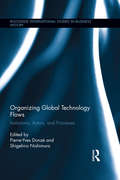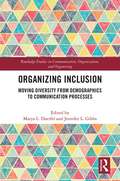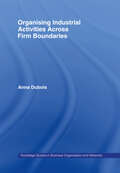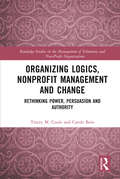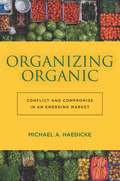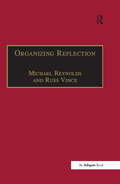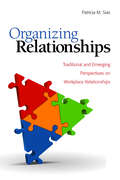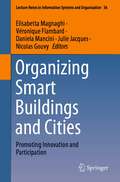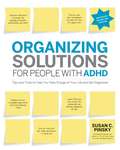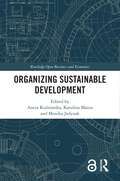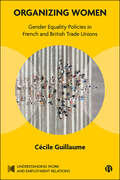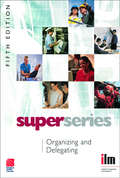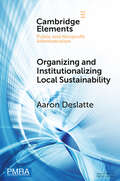- Table View
- List View
Organizing & Organizations: An Introduction
by Stephen FinemanOrganizing and Organizations is well loved by students and lecturers for its accessible, conversational tone and insightful real-life examples introducing the study of organizations and organizational behaviour. Fineman, Gabriel and Sims, eminent academics in the field, cover a wealth of key concepts, research and literature leaving students informed and engaged. The Fourth Edition builds on the strengths of previous editions, to provide you with a textbook that continues to stand out from the rest. This new edition has been fully developed to include: - New chapters on Influence and Power, and Innovation and Change. - A new section within each chapter that highlights the theoretical links informing the chapters. - New review questions to test and apply your understanding of the ideas in each chapter. - New 'reading on' sections that direct you to free links to highly recommended journal articles relating to each chapter's coverage, and found on the companion website. - New critical review questions at the end of each chapter to encourage debate. - Each chapter is now enlivened with pictorial illustrations. - A fully updated glossary of key concepts in the study of organizations Organizing and Organizations integrates a strong critical approach throughout.
Organizing Amazon: Building Worker Power Under Conditions of Fragmentation, Precarity and Regimentation
by Tom VickersBetween August 2022 and July 2024, GMB Union membership at Amazon’s BHX4 Coventry warehouse skyrocketed, with 37 days of strike action resulting in a 28.5% pay rise. Yet despite this, the union narrowly lost a ballot that would have forced Amazon to grant formal recognition. Based on ethnographic research and reflective essays from worker-leaders and organizers, this book offers a rich case study of the factors contributing to the union’s successes and setbacks. It provides a practical organizing model applicable beyond Amazon, offering strategies to engage the workforce, sustain support and develop leadership. An essential toolkit for those navigating the complexities of evolving labour practices, with particular relevance for precarious workers and workplaces where access is limited.
Organizing America: Wealth, Power, and the Origins of Corporate Capitalism
by Charles PerrowAmerican society today is shaped not nearly as much by vast open spaces as it is by vast, bureaucratic organizations. Over half the working population toils away at enterprises with 500 or more employees--up from zero percent in 1800. Is this institutional immensity the logical outcome of technological forces in an all-efficient market, as some have argued? In this book, the first organizational history of nineteenth-century America, Yale sociologist Charles Perrow says no. He shows that there was nothing inevitable about the surge in corporate size and power by century's end. Critics railed against the nationalizing of the economy, against corporations' monopoly powers, political subversion, environmental destruction, and "wage slavery." How did a nation committed to individual freedom, family firms, public goods, and decentralized power become transformed in one century? Bountiful resources, a mass market, and the industrial revolution gave entrepreneurs broad scope. In Europe, the state and the church kept private organizations small and required consideration of the public good. In America, the courts and business-steeped legislators removed regulatory constraints over the century, centralizing industry and privatizing the railroads. Despite resistance, the corporate form became the model for the next century. Bureaucratic structure spread to government and the nonprofits. Writing in the tradition of Max Weber, Perrow concludes that the driving force of our history is not technology, politics, or culture, but large, bureaucratic organizations. Perrow, the author of award-winning books on organizations, employs his witty, trenchant, and graceful style here to maximum effect. Colorful vignettes abound: today's headlines echo past battles for unchecked organizational freedom; socially responsible alternatives that were tried are explored along with the historical contingencies that sent us down one road rather than another. No other book takes the role of organizations in America's development as seriously. The resultant insights presage a new historical genre.
Organizing Christmas
by Philip HancockOrganizing Christmas is an exploration of the organizational character of Christmas. Taking as its starting point the view that Christmas initially achieved popularity due to its potential to promote social cohesion and political stability, this book both charts and scrutinizes its global emergence as the year's preeminent economic and organizational event. Combining historical narrative, original interviews, and social scientific research and theories, it tells the story of how Christmas has come to dominate the festival landscape and how it emerged as an integral component of the global evolution of contemporary social and economic relations. From the pre-Christian celebrations and politics of the turning of the calendar year, through the power games of Elizabethan England and the wily reinvention of the season by industrious Victorians, to today’s huge economic and logistical exercise that relies on everything from global supply chains to the domestic division of labour, Organizing Christmas demonstrates how the season exemplifies the spirit and practices of industrial, and now post-industrial, modernity. As well as documenting this fact, however, Organizing Christmas also critically interrogates what has become a vast festive-industrial complex. From low-paid factory workers in Yiwu to Santa Claus performers in Kingston, readers are given a chance to consider what the cost of this global festival might be and whether it is a price worth paying. Drawing on intellectual resources ranging from Adorno and Horkheimer’s classic critique of the culture industry, thorough Böhme’s analysis of the sociomaterial production of atmospheres, to Bloch’s ‘principle of hope’, it paints a picture of Christmas as a profoundly important, if deeply contested historical, cultural and, most significantly, organizational phenomenon. Aimed at students and academics in Organization Studies, Cultural Studies, and the Sociology of Work and Employment, as well as the general reader interested in the festive season, Organizing Christmas offers a differing perspective on a subject so familiar and yet so often overlooked.
Organizing Corporeal Ethics: A Research Overview (State of the Art in Business Research)
by Alison Pullen Carl RhodesThis book explores the meaning and practice of corporeal ethics in organized life. Corporeal ethics originates from an emergent, embodied and affective experience with others that precedes and exceeds those rational schemes that seek to regulate it. Pullen and Rhodes show how corporeal ethics is fundamentally based in embodied affect, yet practically materialized in ethico-political acts of positive resistance and networked solidarity. Considering ethics in this way turns our attention to how people’s conduct and interactions might be ethically informed in the context of, and in resistance to, the masculine rationality of dominating organizational power relations in which they find themselves. Pullen and Rhodes outline the ways in which ethically grounded resistance and critique can and do challenge self-interested organizational power and privilege. They account for how corporeal ethics serves to destabilize the ways that organizations reproduce practices that negate difference and result in oppression, discrimination, and inequality. The book is suitable for students, scholars and citizens who want to learn more about the radical possibilities of how political actions arising from corporeal ethics can strive for equality and justice.
Organizing Democracy: How International Organizations Assist New Democracies (Chicago Series on International and Domestic Institutions)
by Paul Poast Johannes UrpelainenIn the past twenty-five years, a number of countries have made the transition to democracy. The support of international organizations is essential to success on this difficult path. Yet, despite extensive research into the relationship between democratic transitions and membership in international organizations, the mechanisms underlying the relationship remain unclear. With Organizing Democracy, Paul Poast and Johannes Urpelainen argue that leaders of transitional democracies often have to draw on the support of international organizations to provide the public goods and expertise needed to consolidate democratic rule. Looking at the Baltic states’ accession to NATO, Poast and Urpelainen provide a compelling and statistically rigorous account of the sorts of support transitional democracies draw from international institutions. They also show that, in many cases, the leaders of new democracies must actually create new international organizations to better serve their needs, since they may not qualify for help from existing ones.
Organizing Eating: Communicating for Equity Across U.S. Food Systems (Routledge Research in Communication Studies)
by Sarah E. DempseyThis book develops "organizing eating" as an organizational-communication centered framework for understanding how communication and power combine to actively shape eating and working in the U.S. food system. Drawing together established scholars, the book sheds light on how the interconnected aspects of power are communicative in nature, shaping and constraining the possibilities for organizing across the food system. The chapters provide grounded insight into the role of racism, corporate and state power, food cooperatives, urban farm systems, food policy, and labor practices, drawing attention to the pathways needed to pursue more equitable food systems. Providing readers with a set of useful critical conceptual tools and an understanding of communication frameworks, chapters identify common principles for critical organizing within the food movement and addresses the relevance of the COVID-19 pandemic and the national uprising against anti-Black violence for understanding the urgent possibilities of food justice. This cohesive collection of cutting-edge scholarship will be of interest to organizational communication scholars, critical/cultural communication scholars, environmental communication scholars, and health communication scholars; and the interdisciplinary fields of environmental studies, agriculture and food studies, and organization and labor studies.
Organizing Entrepreneurial Judgment
by Nicolai J. Foss Peter G. KleinEntrepreneurship, long neglected by economists and management scholars, has made a dramatic comeback in the last two decades, not only among academic economists and management scholars, but also among policymakers, educators and practitioners. Likewise, the economic theory of the firm, building on Ronald Coase's (1937) seminal analysis, has become an increasingly important field in economics and management. Despite this resurgence, there is still little connection between the entrepreneurship literature and the literature on the firm, both in academia and in management practice. This book fills this gap by proposing and developing an entrepreneurial theory of the firm that focuses on the connections between entrepreneurship and management. Drawing on insights from Austrian economics, it describes entrepreneurship as judgmental decision made under uncertainty, showing how judgment is the driving force of the market economy and the key to understanding firm performance and organization.
Organizing Entrepreneurship
by Anna Grandori Laura Gaillard GiordaniEntrepreneurship has regained centre stage in the contemporary knowledge-intensive and innovation-driven economy, as well as in research. Integrating classic and recent insights into the organization, economics and management of entrepreneurial activities, Organizing Entrepreneurship aims to blend rigor with relevance, and connects theory with practical problems around key questions, such as: Is there any method in having ‘good ideas’ and discovering opportunities? Through which mechanisms can human, social, technical and financial resources be attracted and dedicated to new projects? Which alternative governance and organizational structures are to be considered for the constitution and organization of a new firm? To grow or not to grow? (Or how to grow without up-sizing)? How do you organize grown-up firms in an entrepreneurial mode? How can environments and external institutions help? Original case studies are discussed and integrated throughout the text, which reflect a wide range of sectors (from agri-business to high tech) and countries (including emerging economies). Providing a unique resource for students and instructors of entrepreneurship and organization, this book also offers new insights to entrepreneurs and investors in the organization of new firms, as well as to managers striving to infuse entrepreneurial behaviors into their already established firms.
Organizing Food, Faith and Freedom: Imagining Alternatives (Organizations and Activism)
by Ozan Nadir AlakavuklarConsumerism, unsustainable growth, waste and inequalities continue to ail societies across the globe, but creative collectives have been tackling these issues at a grassroots level. Based on an autoethnographic study about a free food store in Aotearoa New Zealand, this book presents a first-hand account of how a community is organized around surplus food to deal with food poverty, while also helping the reader to see through the complexity that brings the free food store to life. Examining how alternative economies and relations emerge from these community solutions, the author shows it is possible to think, act and organize differently within and beyond capitalist dynamics.
Organizing For Resilience: Leading and Managing Risk in a Disruptive World
by Christopher Williams Jacqueline Jing YouOrganizing for Resilience provides a fresh and novel insight into research on how leaders can prepare their organizations to face up to shocks and disruptions in a turbulent and unpredictable world. It provides an analysis of the topic of organizational resilience in a comprehensive and integrative way, with fresh theoretical and research implications as well as important implications for leaders.The first book to synthesize themes from across a spectrum of resilience using the metaphor of a ‘resilience landscape’, chapters in Part I are devoted to five analytical levels: individual level resilience; small firms in which major disruption can threaten survival; large firms with disruptions in one part of the organization; large firms facing enterprise-wide disruption; and disruption to a complete community or economic ecosystem of individuals and organizations. Cases and practice insights are presented to bring the topics to life, allowing reflection and debate at each level. In Part II, the construct of the ‘resilience landscape’ is developed, along with a discussion on leadership for resilience by instilling a resilience mind-set and developing capabilities in relational resilience.The book is ideally suited to bachelor’s and master’s degree courses on strategy, organizational behaviour and leadership. PhD and DBA researchers in the field of resilience and strategy will also find the book useful, as will practising consultants and business leaders.
Organizing Genius: The Secrets of Creative Collaboration
by Warren Bennis Patricia Ward BiedermanUncovers the elements of creative collaboration by examining six of the century's most extraordinary groups and distill their successful practices into lessons that virtually any organization can learn and commit to in order to transform its own management into a collaborative and successful group of leaders. Paper. DLC: Organizational effectiveness - Case studies.
Organizing Global Technology Flows: Institutions, Actors, and Processes (Routledge International Studies in Business History)
by Pierre-Yves Donzé Shigehiro NishimuraResearch on the international transfer of technology in economics and management literature has primarily focused on the role of countries and that of companies, in particular multinational enterprises (MNEs). Similarly, economic and business historians have tended to view international technology transfer as a way for economically ‘backward’ countries to acquire new technologies in order to catch up with more developed economies. This volume provides a more in-depth understanding of how the international transfer of technologies is organized and, in particular, challenges the core-periphery model that is still dominant in the extant literature. By looking beyond national systems of innovation, and statistics on foreign trade, patent registration and foreign direct investment, the book sheds more light on the variety of actors involved in the transfer process (including engineers, entrepreneurs, governments, public bodies, firms, etc.) and on how they make use of a broad set of national and international institutions facilitating technology transfer. Put differently, the volume offers a better understanding of the complexity of global technology flows by examining the role and actions of the different actors involved. By bringing together a number of original case studies covering many different countries over the period from the late 19th to the 21st century, the book demonstrates how technology is being transferred through complex processes, involving a variety of actors from several countries using the national and international institutional frameworks.
Organizing Inclusion: Moving Diversity from Demographics to Communication Processes (Routledge Studies in Communication, Organization, and Organizing)
by Marya L. Doerfel Jennifer L. GibbsOrganizing Inclusion brings communication experts together to examine issues of inclusion and exclusion, which have emerged as a major challenge as both society and the workforce become more diverse. Connecting communication theories to diversity and inclusion, and clarifying that inclusion is about the communication processes of organizations, institutions, and communities, the book explores how communication as an organizing phenomenon underlies systemic and institutionalized biases and generates practices that privilege certain groups while excluding or marginalizing others. Bringing a global perspective that transcends particular problems faced by Western cultures, the contributors address issues across sub-disciplines of communication studies, ranging from social and environmental activism to problems of race, gender, sexual orientation, age and ability. With these various perspectives, the chapters go beyond demographic diversity by addressing interaction and structural processes that can be used to promote inclusion. Using these multiple theoretical frameworks, Organizing Inclusion is an intellectual resource for improving theoretical understanding and practical applications that come with ever more diverse people working, coordinating, and engaging one another. The book will be of great relevance to organizational stakeholders, human resource personnel and policy makers, as well as to scholars and students working in the fields of communication, management, and organization studies.
Organizing Industrial Activities Across Firm Boundaries (Routledge Studies in Business Organizations and Networks)
by Anna DuboisThe way in which industrial activities are organised among firms is a fundamental theoretical concern. In practice, firms have found these matters, referred to as make-or-buy issues, difficult to analyse. Organising Industrial Activities Across Firm Boundaries succeeds in combining an analysis of the theoretical background to such issues with an in-depth case study of the practical consequences and implications. The book is an important contribution to the literature on networks, business relationships, out-sourcing and the division of labour.
Organizing Logics, Nonprofit Management and Change: Rethinking Power, Persuasion and Authority (Routledge Studies in the Management of Voluntary and Non-Profit Organizations)
by Tracey M. Coule Carole BainNonprofit organizations are conventionally positioned as generators of social and cultural forms of capital for the common good. As such they occupy a different space to other types of organizations such as corporate firms that exist primarily to generate economic capital for private owners/shareholders. Recent years, however, have seen professionalization promoted widely by funders, policy-makers and nonprofit practitioners across the globe. At the same time, there has been an increasing cross-over of employees from private and public bodies into nonprofits. But do such shifts open up space for the wholesale importation of managerialism into and commercialization of the nonprofit sphere? Are nonprofits at risk of being reconstituted as primarily economic entities, serving the interests of a leadership elite? How are such changes in an organization’s trajectory brought about? What are the consequences for trustees, staff, members and the nature of managerial work? The authors engage with critical questions such as these through a unique insider account of one professional institute experiencing unprecedented changes that challenge its very reason for being. Drawing on a three-year ethnography, they narrate organizational inhabitants’ struggles in their search for purpose and analyze the myriad of changes within different aspects of organizing including structure, strategizing, pay and reward, governance and leadership. The book will enable readers to reframe and rethink organizational change as a process involving power, persuasion and authority, and will be of value to researchers, students, academics and practitioners interested in managerial work and organizational change in non-profit organizations.
Organizing Organic: Conflict and Compromise in an Emerging Market
by Michael HaedickeStakeholders in the organic food movement agree that it has the potential to transform our food system, and yet there is little consensus about what this transformation should look like. Tracing the history of the organic food sector, Michael A. Haedicke charts the development of two narratives that do more than simply polarize the organic debate, they give way to competing institutional logics. On the one hand, social activists contend that organics can break up the concentration of power that rests in the hands of a big, traditional agribusiness. Alternatively, professionals who are steeped in the culture of business emphasize the potential for market growth, for fostering better behemoths. Independent food store owners are then left to reconcile these ideas as they construct their professional identities and hone their business strategies. Drawing on extensive interviews and unique archival sources, Haedicke looks at how these groups make sense of their everyday work. He pays particular attention to instances in which individuals overcome the conflicting narratives of industry transformation and market expansion by creating new cultural concepts and organizational forms. At once an account of the sector's development and an analysis of individual choices within it, Organizing Organic provides a nuanced account of the way the organic movement continues to negotiate ethical values and economic productivity.
Organizing Reflection
by Michael ReynoldsThrough a series of leading-edge contributions from pre-eminent international scholars in the field, Organizing Reflection makes a stimulating and distinctive contribution to the study of reflection. By doing so, it offers the first shift from the individual reflective practitioner to processes of collective and public reflection. The unique and varied contributions focus on the development of notions such as public reflection, collective reflection, and critical reflection. In doing so, they provide critical insights into new thinking and approaches to the role of reflection in organizations, as well as the conceptualization and delivery of learning and change. Organizing Reflection will be of interest to scholars working in business, professional, management and organization studies, to human development academics, and to scholarly practitioners in organizations.
Organizing Relationships: Traditional and Emerging Perspectives on Workplace Relationships
by Patricia M. Sias"Organizing Relationships makes a contribution to the discipline in its treatment of this area from multiple perspectives, in its deliberate engagement/suggestions of future research directions, and its functional purpose of bringing together extant research on this important topic in a coherent and organized way. It adds cumulatively to our knowledge of organizational communication and relationships, it fits within the horizon of the established parameters of our field while opening new areas for engagement, and, moreover, it is a very interesting read. It will, no doubt, become a touchstone for the field of organizational communication." —Janie Hardin Fritz, Duquesne University "This book represents an important step to a relational approach to organizational behavior (communication) by pulling together many different areas/types of relationships. It will be a ′must′ book to anyone who teaches relationships in organization or broadly relational/applied organizational communication." —Jaesub Lee, University of Houston The first book in the field to provide a comprehensive, interdisciplinary treatment of workplace relationships, Organizing Relationships: Traditional and Emerging Perspectives on Workplace Relationships explores both negative and positive workplace relationships, including supervisor–subordinate relationships, peer relationships, workplace friendships, romantic workplace relationships, and customer–client relationships. Author Patricia M. Silas, a recognized scholar in the field, examines workplace relationships from multiple theoretical perspectives, including postpositivism, social construction theory, critical theory, and structuration theory. She helps readers understand the unique influences of the workplace on relationship processes and dynamics. Key Features Examines the role of workplace relationships as information-sharing, resource-distributing, decision-making, and support systems and highlights their importance to both organizational and individual well-being Includes cases in each chapter that demonstrate the usefulness of approaching real-world workplace problems and issues from multiple perspectives Helps readers broaden and enrich the ways they think about workplace relationships and their roles in organizational processes Provides an innovative agenda for future research Organizing Relationships is appropriate for upper-level undergraduate and graduate courses in Workplace Relationships, Relational Communication, Applied Interpersonal Communication, Organizational Communication, Communication Management, Operations/Human Resource Management, Organizational Psychology, and Organizational Sociology.
Organizing Smart Buildings and Cities: Promoting Innovation and Participation (Lecture Notes in Information Systems and Organisation #36)
by Daniela Mancini Elisabetta Magnaghi Véronique Flambard Julie Jacques Nicolas GouvyThe United Nations included sustainable cities and communities in its 2030 SDGs. Cities and, on a smaller scale, neighborhoods, building managers and firms are now adopting technologies and information systems to help achieve the energy, economic, social and environmental transition. This volume gathers contributions on the key organizational success factors for this transition.To do so, it analyzes the role of information systems, use of data, and technological assistance solutions from multiple perspectives. The goal is to develop a framework that can successfully apply information systems to organizational and environmental issues for smart cities and smart buildings. Accordingly, the book addresses living-lab experiment evaluation techniques, and provides critical analyses of the role of the environment, context and users’ behavioral responses. In addition, it discusses key questions on the efficient management of resources, need for appropriate IT solutions, and employing co-creation with users to improve planning and organization.
Organizing Solutions for People with ADHD: Tips and Tools to Help You Take Charge of Your Life and Get Organized
by Susan C. Pinsky<P>ADD (Attention-Deficit Disorder) and ADHD (Attention-Deficit Hyperactivity Disorder) are prevalent in society, afflicting about 4.4% of the adult population. <P>This book outlines organizing strategies that are of value to those who want to improve their organizational (or lack of) skills in their life.
Organizing Sustainable Development (Routledge Open Business and Economics)
by Aneta Kuźniarska Karolina Mania Monika JedynakThe role and meaning of sustainable development have been recognized in the scientific literature for decades. However, there has recently been a dynamic increase in interest in the subject, which results in numerous, in-depth scientific research and publications with an interdisciplinary dimension. This edited volume is a compendium of theoretical knowledge on sustainable development. The context analysed in the publication includes a multi-level and multi-aspect analysis starting from the historical and legal conditions, through elements of the macro level and the micro level, inside the organization. Organizing Sustainable Development offers a systematic and comprehensive theoretical analysis of sustainable development supplemented with practical examples, which will allow obtaining comprehensive knowledge about the meaning and its multi-context application in practice. It shows the latest state of knowledge on the topic and will be of interest to students at an advanced level, academics and reflective practitioners in the fields of sustainable development, management studies, organizational studies and corporate social responsibility.
Organizing Women: Gender Equality Policies in French and British Trade Unions (Understanding Work and Employment Relations)
by Cécile GuillaumeThis book explores the representation of women and their interests in the world of work across four trade unions in France and the UK. Drawing on case studies of the careers of 100 activists and a longitudinal study of the trade unions' struggle for equal pay in the UK, it unveils the social, organizational, and political conditions that contribute to the reproduction of gender inequalities or, on the contrary, allow the promotion of equality. Guillaume’s nuanced evaluation is a call to redefine the role of trade unions in the delivering of gender equality, contributing to broader debates on the effectiveness of equality policies and the enforcement of equality legislation.
Organizing and Delegating (Institute of Learning & Management Super Series)
by Institute of Leadership & ManagementSuper series are a set of workbooks to accompany the flexible learning programme specifically designed and developed by the Institute of Leadership & Management (ILM) to support their Level 3 Certificate in First Line Management. The learning content is also closely aligned to the Level 3 S/NVQ in Management. The series consists of 35 workbooks. Each book will map on to a course unit (35 books/units).
Organizing and Institutionalizing Local Sustainability: A Design Approach (Elements in Public and Nonprofit Administration)
by Aaron DeslatteThis Element explores the role of public managers as designers. Drawing from systems-thinking and strategic management, a process-tracing methodology is used to examine three design processes whereby public managers develop strategies for adapting to climate change, build the requisite capabilities and evaluate outcomes. Across three cases, the findings highlight the role of managers as 'design- oriented' integration agents and point to areas where additional inquiry is warranted. This title is also available as Open Access on Cambridge Core.
